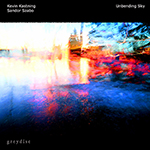Sándor Szabó
Performing artist, Composer, Music researcher
Sándor Szabó performing artist, composer, music researcher
was born in 1956 in Törökszentmiklós. He began his studies
on classical guitar with a private teacher. From the mid-seventies, his
attention was directed towards jazz and improvisation. At the beginning of the
eighties, he studied in Budapest at the Jazz
Department of the Béla Bartók Academy of Music as a visiting student.
Even then, he felt that he should not learn improvisation
tied to a single style, but should synthesize within himself all the musical
influences that his receptivity and sensitivity allow him to
get close to and develop his improvisation skills based on this. Immersion in
Far Eastern music provided him with the best
breeding ground for this. We can follow the artist publicly from 1980. He was
the first in Hungary to start playing solo modern
acoustic guitar music. He attracted attention mainly abroad with his unique
playing combining the technique of stringed instruments
from various cultures, his modern pieces and his deep spirituality. His records
were released in Hungary, England, Italy, Venezuela,
Canada, the United States, and Germany. Since 1998, he has traveled almost all
over the world, giving concerts in Australia,
Japan, Korea, India, Central Asia, Canada, Venezuela, the United States and,
of course, Europe.
He primarily defines himself as a composer who performs
his own works on his instruments. As a musician, he considered
György Szabados to be his spiritual master. The intellectual legacy
of Béla Hamvas, Hazrat Inayat Khan, and Ramana Maharshi had a
great influence on his thinking. He is particularly interested in the
idea of mystical intuition, in which one of the levels of knowing the
world is fulfillment in intuition and meditation. That is why he
considers improvisation to be the most profound form of creation.
All his compositions are based on improvisation. Through
inspiration, the hidden depths of the Universe are revealed as a
projection of the invisible but perceptible expanses of the world. In
his music, the ancient and the modern appear at the same time. His
ideal is a timeless, complex musicality fed by ancient sources, a
message inherent in the common nature of sounds and silence.
In 2010, he composed and presented his first large-format
Hungarian guitar work, Hungarian Guitar Rhapsody, and released it
on CD. In 2016, he completed the 3rd part of the album series
summarizing the art of the 16-string guitar. In 2017, he created his
contemporary music album entitled 21st Century Lute, where he
plays modern music on various lutes. At the request of the US
based Greydisc Records, he presented a special electro/acoustic
music concept on the album Ethereal I, made together with Kevin
Kastning, for which he received Grammy nominations in several categories in
2018 on 3 more Greydisc Records records, on which
he also worked as a composer, guitarist and sound engineer. is
included. Today, his playing can be heard on nearly 100 records.
Sándor Szabó is an experimental musician, a constant
researcher of the sonic possibilities of the instrument and the limits
of the music that can be played on it. From the nineties, he
intensively studied the hitherto untapped possibilities inherent in
digital effect processors and the electric guitar, and by reshaping
the pure sound of the electric guitar, he created exciting, novel
sounds, which can be heard on the albums of the Echolocation and
Ethereal series.
He has been collecting, studying and researching Eastern
music since the 1980s. During this time, he learned to play several
oriental instruments. Knowing the principles and aesthetic systems,
historical and geographical connections of Eastern - especially
Indian and Persian - classical music, they were led to a theory that
our Eastern ancestors had a high-quality classical culture in both music and
dance. In his current music, he intuitively brings up the
possible interpretations of the music of our ancestors that can be
recalled today. His research method corresponds to that of an
archaeologist who is able to reassemble objects from long ago from
fragments. As a result of several decades of research, his Eastern-
inspired music can also be heard on audio recordings. He regularly
gives lectures from his musical writings at Eastern music
conferences in Baku, Samarkand and Shakrishabz.
He has published 3 books so far. In 2011, the Metaphysics of Music,
in 2015, in 2015, in the volume of the study Enélõ Õskelet,
and in
2017, in 2017, the volume of the study entitled Musical
Philosophies. Inspirations from the Middle and Far East appear in his
writings and music, a new awareness of the roots of ancient
Hungarian music, classical concepts and forms, and the free flow of
music and thought in improvisation. His artistic career is the search
for eternal passages between the chasms of various cultures and
human ways of thinking.
In recent years, guitars have been replaced by various
oriental instruments (esraj, guzheng, baglama, lute), and the
polyphony of his music has been replaced by modality and
performance rooted in ancient musicality. Wherever he performs, as
a "Western-Eastern musician", his concerts are almost ritualistic,
his
music, which evokes special moods and creates presence, offers a
real spiritual initiation and elevates its listeners to the dimension of
timelessness.
